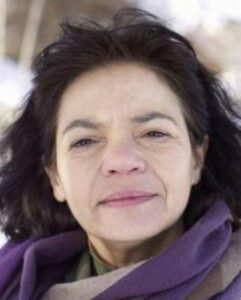-
×
 .این سه زن In eh zan (These three women) 1 × €18.00
.این سه زن In eh zan (These three women) 1 × €18.00

Monireh Baradaran is a former member of the leftist organization Worker’s Way. Agents of the Shah’s regime arrested her shortly before Iran’s 1979 Islamic Revolution, and then released her along with other political prisoners in the autumn of 1978. Islamic Republic authorities re-arrested her, and she spent nine years, from 1981 to 1990, in Evin Prison. While in prison, Baradaran was subjected to mental and physical torture, including the so-called “coffin” tactic, during which prisoners were contained by plywood on three sides, blindfolded and forced to listen to sermons, confessions and prayers blared over loudspeakers at high volume.
Baradaran grew up in a politically conscious family. She was in high school when, in 1971, her brother was imprisoned for opposing the Shah’s regime. She went on to study sociology at university, but never forgot about politics. When she attempted to smuggle some reading material to her brother in prison, she too was arrested.
At that time, the International Red Cross inspected Iranian prisons and, according Baradaran, there was no torture. On the contrary, she felt a certain kind of “joy” in prison. “At Evin’s communal ward there was a good ambience,” she says. “We sang songs, read books and did a lot of things. It was more like a boarding house than prison.” She said “there was no comparison” to what she experienced in the 1980s under the Islamic Republic.
Baradaran became active with the Worker’s Way in late 1979. In September 1981, she was arrested. Her nine years in prison inspired her to write, and after leaving Iran she wrote books about her experience. In her memoirs, she writes about the two weeks during which she was subjected to the “coffin” torture that could have very possibly damaged her psychological state beyond repair.
After her arrest, Baradaran was taken to the Eshrat Abad detention center, once a 19th century royal palace, then an army garrison, and later, under the Revolutionary Guards, turned into the infamous “Prison 59”. When she was taken to the center, she was blindfolded so she would not know where she was. For a few days she was kept in a building that looked like an old bathhouse along with some other detained women. She was then transferred to solitary confinement. She was not tortured there. The hell started when she was transferred to Evin.
At Evin, prisoners were kept for days and perhaps months in the corridors connecting interrogation and torture rooms. Prisoners witnessed the torture of other prisoners by peeking from under their blindfolds or just through listening to their cries. This continued until the interrogations came to an end. “Interrogations and torture started after five days,” Baradaran said. “Whipping was a torture that was used on everybody. And then there was cross-shackle. They would tie one hand from over the shoulder to the other hand in the back. They pushed hard on your wrists so that they could tie them together. It is a torture that completely confuses your system and you don’t know where it hurts. Pain ricochets throughout your body. They kept you like that until they laid you down again and started whipping you without taking off the shackle.”
(From: IranWire)






